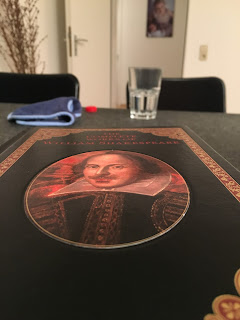“And
I, too, went on my way, the winning and losing, or what
Is
sometimes of all things the worst, the not knowing
One
thing from the other.” (Robert Penn Warren ‘American Portrait Old Style’, 1976,
p.5).
“But
what can you say -
Can
you say – when all-to-be-said is the done?” (Robert Penn Warren ‘American
Portrait Old Style’, 1976, p.6).
“Late,
late, toward sunset, I wandered
Where
old dreams had once been Life’s truth.” (Robert Penn Warren ‘American Portrait
Old Style’, 1976, p.6).
“But
why should I lie here longer?
I
am not dead yet, though in years,
And
the world’s way is yet long to go
And
I love the world even in my anger
And
love is a hard thing to outgrow.” (Robert Penn Warren ‘American Portrait Old
Style’, 1976, p.7).
“And
now, when all voices were stilled and the lamps
Long
out in the tent, and stars
Had
changed place in the sky, I yet lay
By
the spring with one hand in the cold black water
That
showed one star in reflection, alone – and lay
Wondering
and wondering, how many
A
morning would I rise up to greet
And
what grace find.” (Robert Penn Warren ‘Amazing grace in the back country’,
1976, p.10).
“We found nothing to say, for what can a voice
say when
The
world is a voice, no ear needing.” (Robert Penn Warren ‘Star-Fall’, 1976,
p.24).
“Moonlight
stumbles with bright heel
In
the stream, and the stones sing.
What
they sing is nothing, nothing,
But
the joy Time plies to feel
In
fraternal flux and glimmer
With
the stream that does not know
Its
destination and knows no
Truth
but its own moonlit shimmer.
In
my dream Time and water interflow,
And
bubbles of consciousness glimmer ghostly as they go.” (Robert Penn Warren
‘Dream of a Dream’, 1976, p.30).
“All will be in vain
unless – unless what? Unless
You realize that what you think is Truth is only
A husk for something else. Which might,
Shall we say, be called energy, as good a word as any. (…)
(…)
At night I have stood there, and the wide world
Was flat and circular under the storm of the
Geometry of stars. The mountains, in starlight, were black
And black-toothed to define the enormous circle
Of desert of which I was the center. This
Is one way to approach the question.
All is in vain unless you can, motionless, standing there,
Breathe with the rhythm of stars.
You cannot, of course, see your own face, but you know that it,
Lifted, is stripped to white bone by starlight. This is
happening.
This is happiness.” (Robert Penn Warren ‘Unless’, 1976, p.36).
“…
I wake
From
my dream, and know that the shadow
Of
the great spruce close by my house must be falling
Black
on the white roof of winter. The spruce
Wants
to hide the house from the moon, for
The
moon’s intentions have never been quite clear.
The
spruce does not know that a square of moonlight lies cunningly on
The
floor by my bed.” (Robert Penn Warren ‘The mission’, 1976, p.41).
“What
does the veery say, at dusk in shad-thicket?
There
must be some meaning, or why should your heart stop,
As
though, in the dark depth of water, Time held its breath,
While
the message spins on like a spool of silk thread fallen.
(…)
What
meaning, when at the unexpected street corner,
You
meet some hope long forgotten, and your old heart,
Like
neon in shore fog, or distance, glows dimly again?
Will
you waver, or clench stoic teeth and move on?” (Robert Penn Warren ‘Code Book
Lost’, 1976, p.43).
“Yes,
message on message, like wind or water, in light or in dark,
The
whole world pours at us. But the code book, somehow, is lost.” (Robert Penn
Warren ‘Code Book Lost’, 1976, p.44).
“…
You cannot pray. But
You
can wash your face in cold water.” (Robert Penn Warren ‘Sister Water, 1976,
p.48).
“There are many things in the world and you
Are one of them. Many things keep happening and
You are one of them, and the happening that
Is you keeps falling like snow
On the landscape of not-you, hiding hideousness, until
The streets and the world of wrath are choked with snow.”
(Robert Penn Warren ‘Love recognized’, 1976, p.52).
“Mellow, mellow, at thrush-hour
Swells the note to redeem all – Sweat and swink and daytime’s
rancor
And the thought that all’s not worth all.
Blue in distance while the sun dips,
Talus, cliff, and forest melt
Into the promise that soon sleep
Will heal the soul’s identity.” (Robert Penn Warren ‘The smile,
1976, p.53).
“This
is the season when cards are exchanged, or
Addresses
scribbled on paper, with ragged edges. Smiles
Are
frozen with a mortuary precision to seal friendships. Time is up.” (Robert Penn
Warren ‘Departure’, 1976, p.72).


